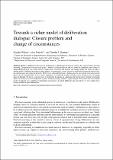Towards a richer model of deliberation dialogue : closure problem and change of circumstances
Abstract
Models of deliberative dialogue are fundamental for developing autonomous systems that support human practical reasoning. The question discussed in this paper is whether existing models are able to capture the complexity and richness of natural deliberation. In real-world contexts, circumstances relevant to the decision can change rapidly. We reflect on today's leading model of deliberation dialogue and we propose an extension to capture how newly exchanged information about changing circumstances may shape the dialogue.Moreover, in natural deliberation, a dialogue may be successful even if a decision on what to do has not been made. A set of criteria is proposed to address the problem of when to close off the practical reasoning phase of dialogue. We discuss some measures for evaluating the success of a dialogue after closure and we present some initial efforts to introduce the new deliberation features within an existing model of agent dialogue. We believe that our extended model of dialogue may contribute to representing that richness of natural deliberative dialogue that is yet to be addressed in existing models of agent deliberation.
Citation
Walton , D , Toniolo , A & Norman , T J 2016 , ' Towards a richer model of deliberation dialogue : closure problem and change of circumstances ' , Argument and Computation , vol. 7 , no. 2-3 , pp. 155-173 . https://doi.org/10.3233/AAC-160009
Publication
Argument and Computation
Status
Peer reviewed
ISSN
1946-2166Type
Journal article
Description
This research was partially supported by Social Sciences and Humanities Research Council of Canada Insight Grant 435-2012-0104. This research was also partially supported by the award made by the RCUK Digital Economy program to the dot.rural Digital Economy Hub at the University of Aberdeen; award ref. : EP/G066051/1. Further refinements of this work were supported by the SICSA PECE scheme.Collections
Items in the St Andrews Research Repository are protected by copyright, with all rights reserved, unless otherwise indicated.

